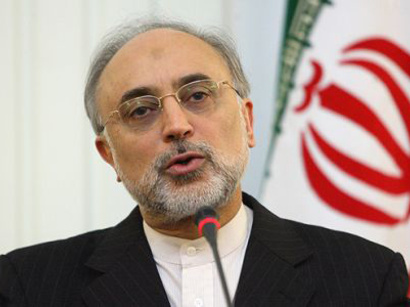Iran, Russia sign deal to boost energy cooperation

By Sara Rajabova
Iran and Russia signed a deal on boosting energy cooperation between the two countries in Moscow on Tuesday.
The agreement was inked by Iranian Foreign Minister Ali Akbar Salehi and Russian Energy Minister Alexander Novak after the meeting of the 10th Iran-Russia joint economic cooperation commission. It covers cooperation in the fields of energy, oil, gas, petrochemical industry, electricity, water and renewable energy resources.
"Today's session was a new page in our relations with Russia," Minister Salehi said after the signing. "It was a breakthrough. We have important ties in many fields including industry, politics, economy, trade, tourism, space and many others."
Salehi said Tehran and Moscow can become "reliable" partners for each other, given their leaders' determination to further boost bilateral cooperation.
The Iranian minister regarded the meeting as a milestone in the two countries' cooperation, and said the two sides have reached understanding and separate agreements during the meetings of their special working groups.
He added that Tehran and Moscow were willing to further develop bilateral relations.
For his part, the Russian energy minister described Tehran as Moscow's important partner and called for further development of ties and cooperation with Iran in all fields.
"Iran is Russia's close neighbor and important partner and the potential for strengthening and developing cooperation between the two countries is considerable," Novak said during the meeting in Moscow.
Novak stressed his country's eagerness to further strengthen cooperation and increase the volume of exchanges between the two countries.
"Russia is interested in increasing exchange of goods and different trade materials and partnership in giant joint ventures with Iran," he said.
Novak also underlined Russian companies' aspirations to operating in Iran and said Iran has invited them to participate in the development of a number of its mineral deposits.
The sides discussed possible changes in the Iranian legislation to enable Russian companies to acquire stakes in mineral extraction projects in Iran.
Iran plans new NPP unit
According to the Iranian foreign minister, Iran hopes in the near future for possibile start of construction of the second reactor at its nuclear power plant in Bushehr with Russia's assistance.
"The Russian Federation is the first priority for the construction of the new nuclear power plant in Iran," Salehi told reporters after the meeting of the inter-governmental commission.
Under the contract with Russia, the Bushehr plant's capacity is to be increased from the current 1,000 megawatt to 5,000 megawatt, in cooperation with Russia, he said.
Salehi noted that the country's current facility in Bushehr produces up to 1,000 megawatts of electricity, which leaves the country with 4,000 megawatts of nuclear-derived electricity to be generated by new power plants.
The minister also hailed the mutual understanding between Tehran and Moscow on the implementation of the 1992 agreement on cooperation in peaceful use of nuclear energy, expressing hope that the sides would soon start the construction of the second unit at Bushehr.
Last summer Russian Nuclear Energy State Corporation (Rosatom) head Sergei Kiriyenko said Russia was not negotiating with Iran on the joint construction of a second power unit at the Bushehr NPP.
The Bushehr plant was originally scheduled for completion in 1999. However, the project reportedly was repeatedly delayed by the Russian side due to intense pressure exerted on Moscow by the United States and its Western allies.
Bushehr's construction was launched by a West German company, the project's initial contractor, in 1975. But in 1980, work was suspended after Germany supported the US sanctions against Iran.
In September 2011, the Bushehr nuclear power plant officially began its operations, generating electricity at 40 percent of its capacity.
The plant, which is operating under the full supervision of the International Atomic Energy Agency, reached its maximum power generation capacity for the first time on August 30, 2012.
Iran and Russia have assured the international community that the plant is fully compliant with high-level safety standards and IAEA safeguards.
The Iranian foreign minister also said the two countries agreed on strengthening cooperation on space science.
"We hope that cooperation with Russia will help to further our achievements in this area," Salehi was quoted as saying.
Salehi praised Iran as the only country "out of 57 Islamic states that produces and launches satellites."
In late January Iran reportedly launched a bio-capsule with a live monkey into space, which reached an altitude of more than 120 kilometers (74.5 miles) and returned to Earth safely.
Following the launch, President Mahmoud Ahmadinejad said he was ready to become Iran's first astronaut.
Iran and Russia maintain vast cooperation in different fields, especially in political and economic fields. Also, the two countries have long held regular consultations on key regional and global issues.
Here we are to serve you with news right now. It does not cost much, but worth your attention.
Choose to support open, independent, quality journalism and subscribe on a monthly basis.
By subscribing to our online newspaper, you can have full digital access to all news, analysis, and much more.
You can also follow AzerNEWS on Twitter @AzerNewsAz or Facebook @AzerNewsNewspaper
Thank you!
